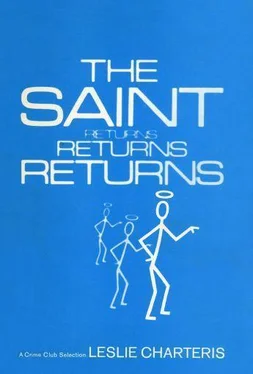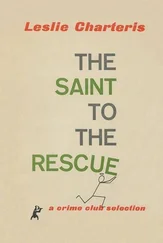Leslie Charteris - The Saint Returns
Здесь есть возможность читать онлайн «Leslie Charteris - The Saint Returns» весь текст электронной книги совершенно бесплатно (целиком полную версию без сокращений). В некоторых случаях можно слушать аудио, скачать через торрент в формате fb2 и присутствует краткое содержание. Город: Garden City, New York, Год выпуска: 1968, Издательство: Crime Club by Doubleday, Жанр: Крутой детектив, на английском языке. Описание произведения, (предисловие) а так же отзывы посетителей доступны на портале библиотеки ЛибКат.
- Название:The Saint Returns
- Автор:
- Издательство:Crime Club by Doubleday
- Жанр:
- Год:1968
- Город:Garden City, New York
- ISBN:нет данных
- Рейтинг книги:5 / 5. Голосов: 1
-
Избранное:Добавить в избранное
- Отзывы:
-
Ваша оценка:
- 100
- 1
- 2
- 3
- 4
- 5
The Saint Returns: краткое содержание, описание и аннотация
Предлагаем к чтению аннотацию, описание, краткое содержание или предисловие (зависит от того, что написал сам автор книги «The Saint Returns»). Если вы не нашли необходимую информацию о книге — напишите в комментариях, мы постараемся отыскать её.
The Saint Returns — читать онлайн бесплатно полную книгу (весь текст) целиком
Ниже представлен текст книги, разбитый по страницам. Система сохранения места последней прочитанной страницы, позволяет с удобством читать онлайн бесплатно книгу «The Saint Returns», без необходимости каждый раз заново искать на чём Вы остановились. Поставьте закладку, и сможете в любой момент перейти на страницу, на которой закончили чтение.
Интервал:
Закладка:
“Smolenko seems to reserve himself for pulling the cord after somebody else has cranked up the guillotine. I’ve followed the MGB system a bit — enough to know who’d be most likely to be handling what. Smolenko’s one of those second-generation Commies with a genius for survival no matter how often the leadership gets shuffled. Must be a pretty effective fellow.”
Fenton nodded glumly.
“And the more effective he is, the worse for our chaps.”
“Obviously,” Simon said to Mueller, “it’s very important to know who makes the originals of these devices. They come from Russia?”
“Nein. They do not. On the outside, they could come from anywhere. On the inside — the miniaturization is too fine to be Russian. We believe Russian manufacture is absolutely out of the question.”
“We must find out where it’s from, if not Russia,” Fenton put in, “and I don’t mean next week. Smolenko passes through here in half an hour on the train to Paris.”
“Know what I smell?” asked Simon thoughtfully. “Chop suey.”
Mueller looked baffled.
“Please?”
Simon pulled up the corners of his eyes, oriental style.
“The original inventors of gunpowder. I think they must be tossing a few exploding fortune cookies in your midst. What could suit them better than to have your men and the Russians at one another’s throats?”
“You make sense, my friend,” Mueller said.
A telephone rang, and the scientist answered it.
“Ja. Moment, bitte. Herr Fenton — Herr Gratz is calling.”
“Fenton here. Oh... I see. Well, keep at it, anyway. He has to be involved somehow.”
“Klaus got away?” asked the Saint.
“Yes,” Fenton said, putting down the phone. “They traced him from the club to the railway station and then lost him.”
“Smolenko,” the Saint said matter-of-factly.
Fenton’s eyes flashed.
“My God, yes. And if Klaus is a trained killer — if he gets Smolenko... we’re in for it!”
Simon nodded toward the phone.
“Better put this in the hands of the regular authorities, don’t you think?”
“The police? But nobody knows Smolenko. He’ll be travelling under another name, probably with an escort of red herrings. We’ve got only twenty minutes. Could the police spot Klaus just from your description?”
Simon started to speak, then didn’t. He could picture his hopes of non-involvement lifting even now from the earth of Free Berlin and winging their way west into the night with that plane he’d never catch.
“You’re the only one of us who’s had a good look at Klaus,” Fenton continued. “There’ll likely be two dozen blond men on that train somewhere near his age.”
“Now, Bill...”
“Simon,” the intelligence officer said crisply, “you’ve fifteen minutes to catch the Berlin-Paris Express. I’ll stay behind here covering other eventualities.”
“Like the champagne at the Bunny Club.”
Fenton grinned.
“There are some things there that could stand closer scrutiny.”
“While I’m getting scrutinized by Rasputin’s successor.”
“Come outside.”
Somehow or other Fenton already had a cab waiting at the door with its flag down, and he smiled at Simon’s reaction to his confident efficiency.
“I felt sure you’d choose the proper course,” Fenton said.
The dash for the Hauptbahnhof was efficient too. In spite of screeching turns and roaring spurts down the straightaways, no one was killed, and they arrived at the station just on time. Simon sprinted across the loading area and jumped aboard the Paris-bound express just as it started to creak from its concrete slip.
But by that time any lingering nostalgia he might have felt for his earlier plans had been suppressed by the excitement that had begun to course through his blood. At the Bunny Club he’d been like an idling machine, cooling down between one strenuous trial and the next, but ready to move when the signal came. Now the signal had come, unexpectedly but unmistakably, and he was instantaneously co-ordinated, his senses keen, his nerves calm but alert, his whole body a magnificently operating unit.
The train was picking up speed, passing from under the huge canopy of the station’s roof. The wheels rumbled smoothly underfoot, and the car swayed slightly. The few passengers who had been waving goodbye to friends from the corridor windows went into their compartments, and almost suddenly the entire population of the train seemed to settle into midnight somnolence.
Simon had, even in his haste, taken care to enter the train at the dividing point between the second- and third-class sections of the train. The third-class cars were at the rear, and there the unfortunate passengers would be nodding shoulder-to-shoulder on bare benches amid whimpering infants and greasy lunch bags. It seemed unlikely, however, that the guardians of the proletarian revolution would go quite that far to demonstrate their principles or even to achieve anonymity. The more luxuriantly upholstered and privately compartmented segments of the train were a much better bet. As for Klaus, he could be anywhere, assuming he was on the train at all, and he would most likely be surveying the same territory that Simon now proceeded to cover.
The Saint took on a sleepy, possibly somewhat alcoholic air, and wove his way along the corridor peering through the window of each compartment with the amiably confused expression of a man who’d forgotten the location of his seat. To the few people who were awake enough or alert enough to notice him, he gave an apologetic smile as he passed on.
His task was, of course, complicated by the fact that he had no idea of the appearance of the Russians for whom he was searching. He could only hope that his experience and instincts would serve him as well as they had on many former occasions.
He covered three second-class cars and two first-class cars with no success. The street lights of the Berlin suburbs had long since been left behind, the checkpoint into Eastern Germany had been negotiated. In place of the city’s brightness there was the black rural landscape, marked here and there by the glow of a village or town, blending with the inner reflections of the corridor windows.
Then the opening of the door of the next car forward produced hefty odors of wine, cigars, cigarettes, and beer, along with subdued sounds of revelry. Simon had entered the refreshment lounge, where an exhausted and rumpled waiter was dispensing goodies to a troupe of plump insomniacs in various stages of hilarity, gravity, or asphyxiation from cigar smoke.
At the extreme opposite end of the car was a familiar face whose slate gray eyes were looking startled at Simon through the haze. Simon looked at the face. It belonged to Hans Klaus.
The Saint tried to shove his way through the lounge car before Klaus could lose himself somewhere up ahead, but it was a little like trying to run unhindered through the last three minutes of a football match. First the waiter blocked the aisle, and then an extraordinarily broad-backed man with a size-twenty neck and a determined aversion to being pushed around.
By the time Simon arrived at the next car, a sleeper whose compartments had no windows facing the corridor, Klaus was just disappearing at the other end. In the next car, Simon hurried by two men who apparently, until the rapid passage of Klaus, had been resting their elbows on the lowered windows, enjoying the night air. They watched the Saint as he came to the end of his pursuit. The door at the end of the car was locked, and a sign in three languages told him: PASSENGERS FORBIDDEN: TRAIN CREW ONLY.
The little toilette to the Saint’s left, which might have provided the last publicly available hiding place, was unlocked and empty. Simon looked back toward the two men who were observing him with sharp but controlled interest from their station halfway up the corridor. His main comfort at the moment was that if they were comrades of Klaus’s they’d have been at his neck before this. There was no sign, in fact, that Klaus meant anything to them at all. On their faces — the one broad and red, the other somewhat triangular and pallid — was none of the overt alarm or amusement which might have been normally aroused by the scene they had just witnessed.
Читать дальшеИнтервал:
Закладка:
Похожие книги на «The Saint Returns»
Представляем Вашему вниманию похожие книги на «The Saint Returns» списком для выбора. Мы отобрали схожую по названию и смыслу литературу в надежде предоставить читателям больше вариантов отыскать новые, интересные, ещё непрочитанные произведения.
Обсуждение, отзывы о книге «The Saint Returns» и просто собственные мнения читателей. Оставьте ваши комментарии, напишите, что Вы думаете о произведении, его смысле или главных героях. Укажите что конкретно понравилось, а что нет, и почему Вы так считаете.












